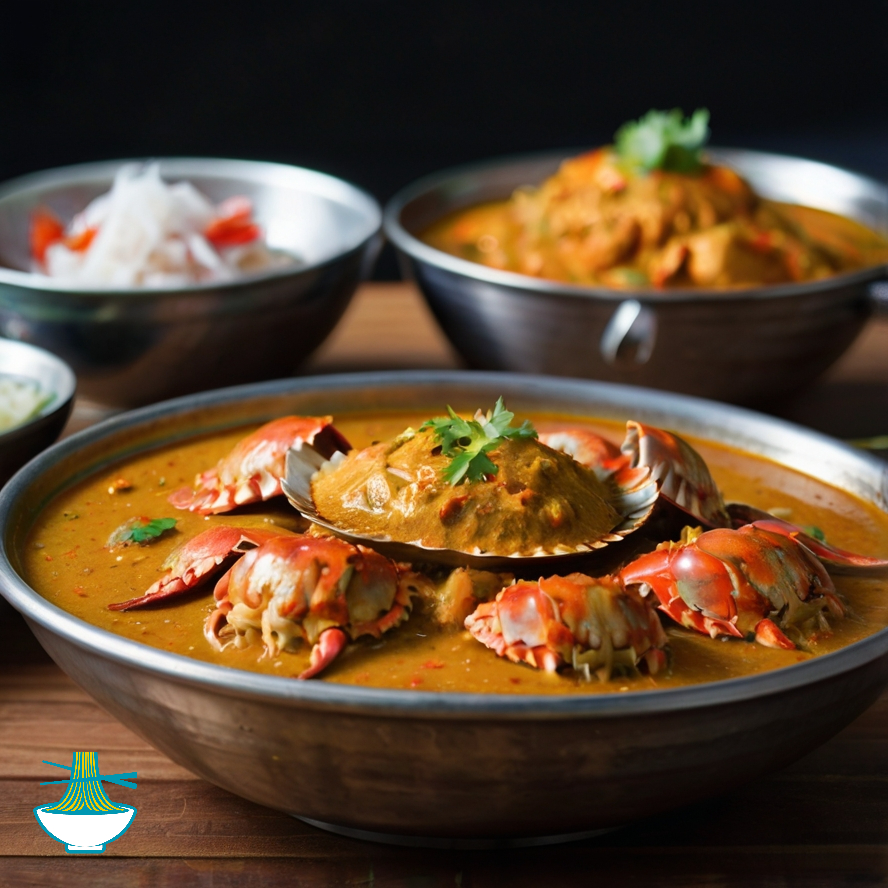Originating from the stunning islands of Tuvalu in the Pacific, Tuvaluan Crab Curry is a beloved dish celebrated for its rich flavors and cultural significance.
This exquisite recipe combines succulent crab meat with aromatic spices and creamy coconut milk, resulting in a tantalizing culinary experience that captures the essence of Tuvaluan cuisine. With roots deeply embedded in Tuvalu's traditional cooking practices, this dish reflects the islanders' reliance on local seafood and their mastery of blending flavors to create culinary delights. From its humble beginnings as a staple food of the Tuvaluan people to its recognition as a cherished delicacy enjoyed both locally and internationally, Tuvaluan Crab Curry continues to enchant palates and preserve the culinary heritage of Tuvalu.
Ingredients:
- 2 lbs (900g) fresh crab, cleaned and cracked
- 1 onion, finely chopped
- 2 cloves garlic, minced
- 1-inch piece of ginger, grated
- 1 tomato, diced
- 1 can (13.5 oz / 400ml) coconut milk
- 2 tablespoons curry powder
- 1 teaspoon turmeric powder
- Salt and pepper to taste
- Fresh cilantro for garnish
- Cooking oil
Method:
1. Heat cooking oil in a large pan over medium heat. Add chopped onion, minced garlic, and grated ginger. Sauté until fragrant and onions are translucent.
2. Add diced tomato to the pan and cook until softened.
3. Sprinkle curry powder and turmeric powder over the mixture, stirring well to combine.
4. Pour in the coconut milk, stirring continuously until the sauce is smooth and well blended.
5. Carefully add the cleaned and cracked crab to the pan, ensuring each piece is coated with the sauce.
6. Season with salt and pepper to taste. Cover the pan and let the curry simmer for about 15-20 minutes, or until the crab is cooked through and the flavors have melded.
7. Once cooked, remove the pan from heat and garnish with fresh cilantro.
8. Serve hot with steamed rice or your favorite side dish. Enjoy your delicious Tuvaluan Crab Curry!
Nutrition Value:
1. Fresh Crab (2 lbs / 900g):
- Calories: Approximately 530 kcal
- Carbohydrates: 0g
- Protein: Approximately 106g
- Fat: Approximately 6g
- Sodium: Varies based on cooking method; typically low
- Cholesterol: Approximately 280mg
- Vitamins: High in vitamin B12, vitamin C, and selenium
- Minerals: Rich in phosphorus, zinc, and copper
- Nutritional Benefits: Crab is an excellent source of lean protein and essential nutrients like vitamin B12 and selenium, which support healthy metabolism and immune function.
2. Onion (1 medium onion, finely chopped):
- Calories: Approximately 44 kcal
- Carbohydrates: Approximately 10g
- Protein: Approximately 1g
- Fat: Approximately 0g
- Sodium: Approximately 2mg
- Cholesterol: 0mg
- Vitamins: High in vitamin C and vitamin B6
- Minerals: Contains potassium and folate
- Nutritional Benefits: Onions are rich in antioxidants and anti-inflammatory compounds, promoting heart health and immune function.
3. Garlic (2 cloves, minced):
- Calories: Approximately 9 kcal
- Carbohydrates: Approximately 2g
- Protein: Approximately 0g
- Fat: Approximately 0g
- Sodium: Approximately 1mg
- Cholesterol: 0mg
- Vitamins: Contains vitamin C and vitamin B6
- Minerals: Contains small amounts of calcium and iron
- Nutritional Benefits: Garlic is known for its immune-boosting properties and may help lower blood pressure and improve cholesterol levels.
4. Ginger (1-inch piece, grated):
- Calories: Approximately 2 kcal
- Carbohydrates: Approximately 0.5g
- Protein: Approximately 0g
- Fat: Approximately 0g
- Sodium: Approximately 0mg
- Cholesterol: 0mg
- Vitamins: High in vitamin C and vitamin B6
- Minerals: Contains potassium and manganese
- Nutritional Benefits: Ginger has anti-inflammatory and digestive properties, aiding in digestion and providing relief from nausea.
5. Tomato (1 medium tomato, diced):
- Calories: Approximately 22 kcal
- Carbohydrates: Approximately 5g
- Protein: Approximately 1g
- Fat: Approximately 0g
- Sodium: Approximately 6mg
- Cholesterol: 0mg
- Vitamins: High in vitamin C, vitamin A, and vitamin K
- Minerals: Contains potassium and folate
- Nutritional Benefits: Tomatoes are rich in antioxidants like lycopene, which may reduce the risk of chronic diseases and promote heart health.
6. Coconut Milk (1 can - 13.5 oz / 400ml):
- Calories: Approximately 660 kcal
- Carbohydrates: Approximately 13g
- Protein: Approximately 6g
- Fat: Approximately 70g
- Sodium: Approximately 40mg
- Cholesterol: 0mg
- Vitamins: Contains vitamin C, vitamin E, and vitamin B6
- Minerals: Contains potassium, phosphorus, and magnesium
- Nutritional Benefits: Coconut milk provides healthy fats and may improve cholesterol levels, support weight loss, and boost brain health.
7. Curry Powder (2 tablespoons):
- Calories: Approximately 40 kcal
- Carbohydrates: Approximately 7g
- Protein: Approximately 2g
- Fat: Approximately 1g
- Sodium: Approximately 120mg
- Cholesterol: 0mg
- Vitamins: Contains small amounts of vitamin C and vitamin K
- Minerals: Contains iron and potassium
- Nutritional Benefits: Curry powder is a blend of various spices, offering antioxidant properties and potential anti-inflammatory benefits.
8. Turmeric Powder (1 teaspoon):
- Calories: Approximately 8 kcal
- Carbohydrates: Approximately 2g
- Protein: Approximately 0g
- Fat: Approximately 0g
- Sodium: Approximately 1mg
- Cholesterol: 0mg
- Vitamins: High in vitamin C and vitamin B6
- Minerals: Contains manganese and iron
- Nutritional Benefits: Turmeric is renowned for its anti-inflammatory and antioxidant properties, potentially aiding in the prevention of chronic diseases.
9. Salt and Pepper (to taste):
- Calories: Negligible
- Carbohydrates: Negligible
- Protein: Negligible
- Fat: Negligible
- Sodium: Varies based on amount added
- Cholesterol: 0mg
- Nutritional Benefits: Salt provides essential electrolytes, while pepper contains antioxidants like piperine, which may enhance nutrient absorption.
10. Fresh Cilantro (for garnish):
- Calories: Approximately 1 kcal
- Carbohydrates: Approximately 0g
- Protein: Approximately 0g
- Fat: Approximately 0g
- Sodium: Approximately 1mg
- Cholesterol: 0mg
- Vitamins: High in vitamin K and vitamin C
- Minerals: Contains small amounts of calcium and iron
- Nutritional Benefits: Cilantro adds freshness and flavor to dishes and may have detoxifying properties and potential benefits for heart health.
11. Cooking Oil (used for sautéing):
- Nutritional values vary based on the type of oil used (e.g., olive oil, vegetable oil, coconut oil).
- Provides fat for cooking and may contain vitamins like vitamin E (in oils like olive oil).
- Depending on the type and quantity used, can contribute to total calorie intake and fat consumption.


Comments